This article has been reviewed according to Science X's editorial process and policies. Editors have highlighted the following attributes while ensuring the content's credibility:
fact-checked
peer-reviewed publication
trusted source
proofread
Australian scientists debunk role of 'junk cells' in fight against malaria

Researchers from The Australian National University (ANU) have discovered a previously unknown ability of a group of immune system cells, known as atypical B cells (ABCs), to fight infectious diseases such as malaria.
The discovery provides new insight into how the immune system fights infections and brings scientists a step closer to harnessing the body's natural defenses to combat malaria. The research is published in Science Immunology.
The scientists say ABCs could also be key to developing new treatments for chronic autoimmune conditions such as lupus.
According to the researchers, ABCs have long been associated with malaria, as malaria patients have more of these cells in their system compared to the general population.
"In this study, we wanted to understand the mechanisms that drive the creation of ABCs in the immune system, but also find out whether these cells are good or bad for us when it comes to fighting infection," lead author Dr. Xin Gao, from ANU, said.
"Although ABCs are known to contribute to chronic inflammatory diseases and autoimmunity, we've discovered a previously unknown ability of these cells to fight disease. In this sense, ABCs are like a double-edged sword.
"Contrary to past belief, ABCs are not junk cells; they are more important than we thought.
"Our research found that ABCs are also instrumental in developing T follicular helper cells. These helper cells generate powerful antibodies that help the body fight malaria parasites.
"Antibodies can block parasites in the blood as they travel from the site of the infectious mosquito bite to the liver, where the infection is first established."
In 2022, malaria killed more than 600,000 people worldwide. Although the disease is preventable and curable, scientists face an uphill battle to find long-lasting treatments as malaria parasites continue to find new ways to build resistance to current therapies.
Using gene-editing technology on mice, the ANU researchers discovered a gene called Zeb2 is crucial to the production of ABCs.
"We found that manipulating the Zeb2 gene disrupted the creation of ABCs in the immune system," study co-author Professor Ian Cockburn, from The ANU John Curtin School of Medical Research, said.
"Importantly, we found that mice without the Zeb2 gene were unable to control malaria infection.
"Therefore, the findings show that ABCs play a crucial role in fighting malaria infections."
The researchers say targeting ABCs could also pave the way for new treatments for certain autoimmune diseases such as lupus.
"ABCs also appear in large numbers in many autoimmune diseases, including lupus, which can be life-threat[en]ing in severe cases," Professor Cockburn said.
"By developing a better understanding of the role of ABCs in the immune system and the cells' role in fighting disease, it could bring us a step closer to one day developing new and more effective therapies."
More information: Xin Gao et al, Zeb2 drives the formation of CD11c + atypical B cells to sustain germinal centers that control persistent infection, Science Immunology (2024). DOI: 10.1126/sciimmunol.adj4748 , www.science.org/doi/10.1126/sciimmunol.adj4748



















